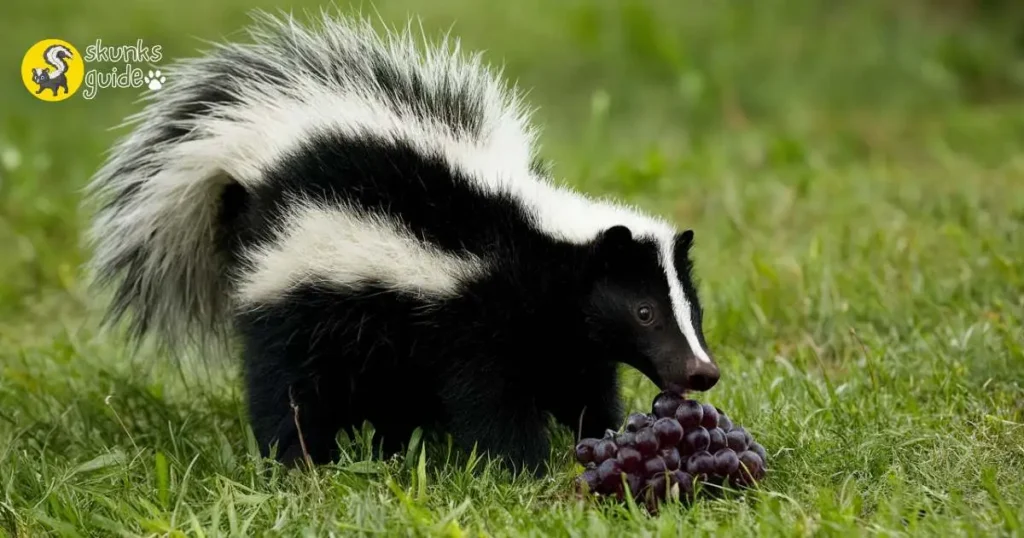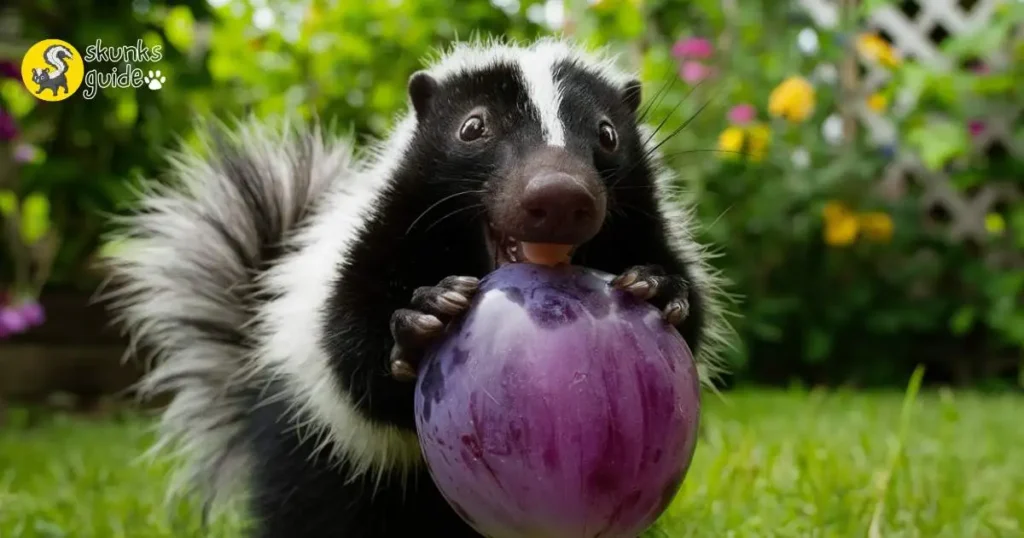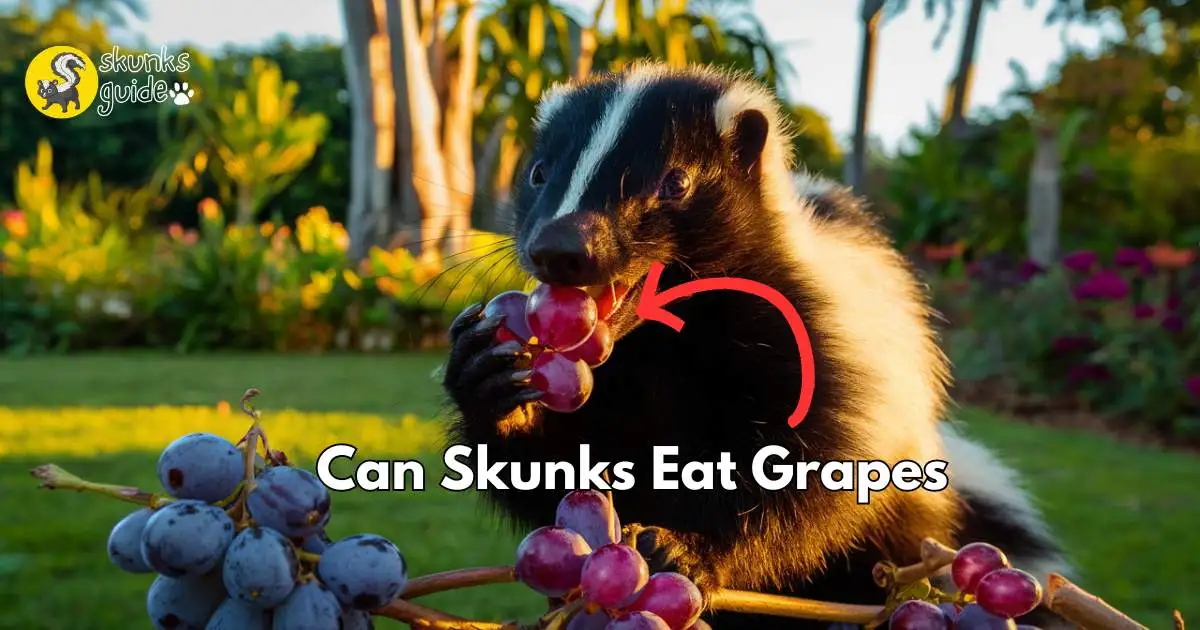Can You Feed Grapes to Skunks?
Last updated on November 4th, 2024 at 07:16 am
Yes, skunks can eat grapes, but it’s important to be careful with how many they eat. As a skunk pet owner and wildlife enthusiast, I’ve learned that while grapes aren’t harmful, too many can be bad for them because of the high sugar. If you’re curious about how to keep your skunk healthy and happy, stick around to find out more about what they should and shouldn’t eat!
Grapes And Skunks
Skunks are fascinating creatures. They have unique diets. Many wonder if skunks can eat grapes. Grapes are sweet and juicy fruits. They attract many animals. But are they safe for skunks? Let’s explore the potential health benefits and risks.
Potential Health Benefits
Grapes contain several nutrients. These can benefit skunks in various ways:
- Vitamins: Grapes are rich in vitamins A and C.
- Antioxidants: They contain antioxidants that support health.
- Hydration: Grapes have high water content.
These nutrients may help boost a skunk’s immune system. Grapes can also provide energy. A small amount might be a tasty treat.
Risks And Concerns
Feeding grapes to skunks has risks. Some skunks may react poorly to grapes. Consider these concerns:
| Concern | Description |
|---|---|
| Kidney Damage | Grapes can cause kidney issues in some animals. |
| High Sugar Content | Too much sugar can lead to obesity. |
| Allergic Reactions | Some skunks may be allergic to grapes. |
Always monitor skunks after feeding them grapes. Look for signs of distress. It’s safer to limit grape intake.
Serving Grapes To Skunks
Feeding skunks can be fun. Skunks enjoy various foods. Grapes are often a tasty treat. Learn how to serve grapes safely.

Preparation Techniques
Proper preparation keeps skunks healthy. Follow these steps:
- Wash the grapes: Rinse under cool water. Remove dirt and pesticides.
- Remove stems: Take off all stems. They can be hard to digest.
- Cut into halves: This prevents choking. Smaller pieces are easier to eat.
- Serve fresh: Offer grapes shortly after cutting. Freshness matters!
Portion Control
Portion control is vital for skunk health. Too many grapes can cause problems. Follow these guidelines:
| Skunk Weight | Grapes Per Serving |
|---|---|
| Less than 2 lbs | 1-2 grapes |
| 2-5 lbs | 3-5 grapes |
| Over 5 lbs | 6-10 grapes |
Limit servings to a few times per week. Watch for signs of upset stomach. Always provide fresh water.
Other Fruits In Skunks’ Diets
Skunks are omnivores. They enjoy a variety of fruits. Understanding what fruits they can eat is important for their health. Certain fruits provide essential nutrients. Some fruits are safe, while others can be harmful.
Safe Fruit Options
Many fruits are safe for skunks. Here are some great options:
- Apples: Remove seeds before feeding.
- Bananas: High in potassium, loved by skunks.
- Blueberries: Packed with antioxidants.
- Strawberries: Delicious and nutritious.
- Mangoes: Remove the pit first.
- Pears: Ensure seeds are taken out.
Fruits To Avoid
Some fruits can be harmful to skunks. Avoid the following:
- Grapes: Can cause kidney issues.
- Cherries: Contain cyanide in the pits.
- Avocado: Contains persin, toxic to skunks.
- Rhubarb: Leaves are poisonous.
- Citrus fruits: May upset their stomachs.
Toxicity And Skunks
Understanding what skunks can safely eat is essential. Some foods can harm them. Grapes are one such food. They may seem harmless but can cause serious issues.
Common Toxic Foods
Skunks should avoid various foods. Here’s a list of common toxic foods for skunks:
- Chocolate
- Onions
- Garlic
- Avocado
- Caffeinated products
- Raisins
- Grapes
| Food Item | Toxic Effect |
|---|---|
| Chocolate | Heart issues, seizures |
| Onions | Red blood cell damage |
| Grapes | Kidney failure |
Signs Of Toxicity
Recognizing the signs of toxicity is crucial. Watch for these symptoms:
- Vomiting
- Diarrhea
- Lethargy
- Loss of appetite
- Abdominal pain
- Unusual behavior
If you notice any of these signs, contact a vet immediately. Quick action can save a skunk’s life.
Balancing Skunks’ Meals
Feeding skunks a balanced diet is essential for their health. Skunks need a mix of protein, fruits, and vegetables. This variety helps them stay active and healthy.

Incorporating Variety
Skunks thrive on a diverse diet. Here are some foods to include:
- Fruits: Apples, bananas, and berries.
- Vegetables: Carrots, peas, and leafy greens.
- Protein: Insects, eggs, and cooked meats.
Grapes can be a tasty treat. However, they should only be given in moderation. Too many grapes can cause stomach issues. Always wash fruits thoroughly before serving.
Supplementing With Vitamins
Dietary supplements can boost skunks’ health. Consider adding these vitamins:
| Vitamin | Benefit |
|---|---|
| Vitamin A | Supports vision and immune function. |
| Vitamin D | Promotes bone health. |
| Vitamin E | Acts as an antioxidant. |
Consult a vet before adding supplements. Each skunk has unique needs. Proper nutrition supports their overall well-being.
Human Foods And Skunks
Skunks are curious creatures. They often explore human food. Many wonder, if skunks can eat grapes. Understanding safe and harmful foods, is essential for their health. Let’s dive into what human food skunks can enjoy.
Safe Human Foods
Some human foods are safe for skunks. Here’s a list of those foods:
- Fruits: Apples, blueberries, bananas
- Vegetables: Carrots, peas, cooked sweet potatoes
- Grains: Rice, oats, whole grain bread
- Protein: Cooked chicken, eggs, plain yogurt
Introduce these foods slowly. Watch for any reactions. Always chop fruits and veggies into small pieces.
Foods To Exclude
Not all human foods are safe for skunks. Some can be harmful. Here are foods to avoid:
| It can cause kidney damage | Reason to Exclude |
|---|---|
| Grapes | Can cause kidney damage |
| Chocolate | Toxic to many animals |
| Onions | Can harm red blood cells |
| Garlic | Can be toxic in large amounts |
Always double-check before feeding skunks. Their health should be the top priority.
Consulting With A Veterinarian
Consulting with a veterinarian is crucial for your skunk’s health. Skunks have unique dietary needs. Understanding what they can eat helps prevent health issues. Grapes can be a concern. Always ask a vet for guidance.
Dietary Recommendations
Skunks need a balanced diet. Here are some dietary recommendations:
- Fruits: Offer in moderation.
- Vegetables: Fresh and chopped are best.
- Proteins: Include insects and cooked meats.
- Commercial Foods: Use high-quality skunk food.
Grapes may not be ideal. Some pets can have reactions. Always check with a vet before adding new foods.
Regular Health Check-ups
Regular health check-ups ensure your skunk stays healthy. Schedule visits every 6 to 12 months. Your vet will:
- Assess weight and growth.
- Check for dental health.
- Evaluate diet and nutrition.
- Look for signs of illness.
Early detection helps prevent serious issues. Follow your vet’s advice for a happy skunk.
Frequently Asked Questions
What Foods Are Poisonous To Skunks?
Skunks should avoid foods like chocolate, onions, garlic, avocados, and caffeine. These items can be toxic and harmful to their health. Always provide safe, appropriate foods to ensure their well-being. Stick to fruits, vegetables, and specially formulated skunk diets for optimal nutrition.
What Fruits Can Skunks Eat?
Skunks can safely eat fruits like apples, bananas, berries, and melons. Avoid citrus fruits as they may cause digestive issues. Always wash fruits thoroughly and remove any seeds or pits before feeding. Moderation is key to a balanced diet for skunks.
What Is Skunk’s Favorite Food?
Skunks primarily enjoy a varied diet of insects, fruits, and small animals. They commonly eat grubs, berries, and plants. Their flexible eating habits allow them to thrive in diverse environments. Skunks are omnivorous, making them adaptable foragers in both urban and rural settings.
Conclusion
Skunks can eat grapes, but moderation is key. These fruits offer some nutrients, yet they can also lead to digestive issues. Always ensure that any treats for skunks are safe and appropriate. Understanding their dietary needs helps keep them healthy and happy.

